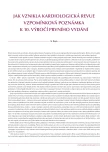-
Medical journals
- Career
Aneurysm of the thoracic aorta
Authors: P. Piler; P. Fila
Authors‘ workplace: Centrum kardiovaskulární a transplantační chirurgie Brno
Published in: Kardiol Rev Int Med 2008, 10(1): 18-25
Overview
Aneurysm of the thoracic aorta is one of the most common and most important condition of chronic aortic disease, except of true aneurysm in this category we can include false aortic aneurysm, chronic aortic dissection, penetrating atheroslerotic ulcer and intramural hematoma. According to localization can be divided to aneurysm of ascending thoracic aorta aneurysm, aneurysm of aortic arch, descending thoracic aorta aneurysm and thoracoabdominal aneurysm. Every of this localizations have own speciality. Aneurysms of ascending aorta are most often surgical treated condition, during procedures at aortic arch is most important and technicaly most exacting brain protection and procedures at thoracoabdominal aorta are sugrically most important procedures, which need total access including also high quality of intensive care.
Authors describe etiology, patophysiology, symptoms and signs, diagnostic techniques, natural history and techniques of operations.
At the end of paper authors show their own group. In Centre of Cardiovascular Surgery and Transplation during 5 years there were 125 patients surgically treated with hospitalization mortality 1,6 %.Keywords:
aneurysm of thoracic aorta - aneurysm of aortic arch - aneurysm of descending aorta and aneurysm of thoracoabdominal aorta - brain protection - hypothermic circulatory arest
Sources
1. Majimder PP, St Jean PL, Ferrell JE et al. On the inheritance of the abdominal aorta aneurysm. Am J Hum Genet 1991; 48(1): 164-170.
2. Bickerstaff LK, Pairolero PC, Hollier LH et al. Thoracic aortic aneurysm: a population-based study. Surgery 1982; 92(6): 1103-1108.
3. Coady MA, RizzoJA, Goldstein LJ, Elefteriades JA. Natural history, pathogenesis, and etiologyof thoracic aortic aneurysms and dissections. Cardiol Clin 1999; 17(4): 615-635.
4. Larson EW, Edwards WD. Risk factors of aortic dissection: a necropsy study of 161 cases. J Am Cardiol 1984; 53(6): 849-855.
5. Schoen F. Blood vesels. In: Cotran R, Kantor V. Collins C (eds). Robins Pathologic Basis of disease. Philadelphia: WB Saunders 1999
6. O’Rourke MF, Avolio AP, Nichols WW. Left-ventricular-systemic arterial coupling in humans and strategies to inprove coupling in disease states. In Yin FCP (ed)Ventricular/Vascular coupling: Clinical, Physiological andEngineering Aspects. New York, Springer-Verlag, 1987
7. Kainulainen K, Pulkinnen L, Savolainen A et al. Location on chromosome 15 of the gene defect causing Marfan syndrome. N Angl J Med 1990; 323(14): 935-939.
8. Tsipouras P, Del Mastro R, Sarfarazi M et al. Genetic linkage of the Marfan syndrome, ectopia lentis, and congenital contractural arachnodactyly to the fibrilin genes on chromosome 15 and 5. The international Marfan syndrome Collaboration Study. A Engl J Med 1992; 326(14): 905-909.
9. Marsalese DL, Moodie DS, Vacante M et al. Marfan,s syndrome: natural history and long-term follow-up of cardiovascular involvement. J Am Coll Cardiol 1989; 14 : 422-428.
10. Pope FM, Narcisi P, Nicholls SC et al. Clinical presentation of Ehlers-Danlos syndrome type IV. Arch Dis Child 1988; 63(9): 1016-1025.
11. Chan FY, Crawford ES, Coselli JS et al. In situ prosthetic grat replacement for mycotis aneurysm of aorta. Ann Thorac Surg 1989; 47(2): 193-203.
12. Earnest F IV, Muhm JR, Sheedy PF II. Roentgenographic findings in thoracic aortic dissection. Mayo Clin Proc 1979; 54(1): 43-50.
13. Kouchoukos NT, Wareing TH, Izumoto H, Murphy SF, Klausig W, Abboun D. Elective hypothermic cardiopulmonary bypass and circulatory arrest for spinal cord protection during operations on thoracoabdominal aorta. J Thorac Cardiovasc Surg 1990; 99(4): 659-664.
14. Davies RR, Goldstein LJ, Coady MA, Tittle SL, Rizzo JA, Kopf GS et al. Yearly rupture or dissection rates for thoracic aortic aneurysms: simple prediction based on size. Ann Thorac Surg 2002; 73(1): 17-27, Discussion 27-28.
15. Gott VL, Gillinov AM, Pyeritz RE, Cameron DE, Reitz BA, Greene PS et al. Aortic root replacement. Risk factor analysis of a seventeen-year experience with 270 patients. J Thorac Cardiovac Surg 1995; 109(3): 563-544; Discussion 544-545
Labels
Paediatric cardiology Internal medicine Cardiac surgery Cardiology
Article was published inCardiology Review

2008 Issue 1-
All articles in this issue
- Speckle tracking echocardiography is a new, non-invasive method for the assessment of left ventricular global and regional function
- What is new in heart transplantation
- Aneurysm of the thoracic aorta
- Central blood pressure: how to improve the measurement of blood pressure in the 2nd century after Korotkoff
- Cardiology Review
- Journal archive
- Current issue
- Online only
- About the journal
Most read in this issue- Aneurysm of the thoracic aorta
- Speckle tracking echocardiography is a new, non-invasive method for the assessment of left ventricular global and regional function
- Central blood pressure: how to improve the measurement of blood pressure in the 2nd century after Korotkoff
- What is new in heart transplantation
Login#ADS_BOTTOM_SCRIPTS#Forgotten passwordEnter the email address that you registered with. We will send you instructions on how to set a new password.
- Career

